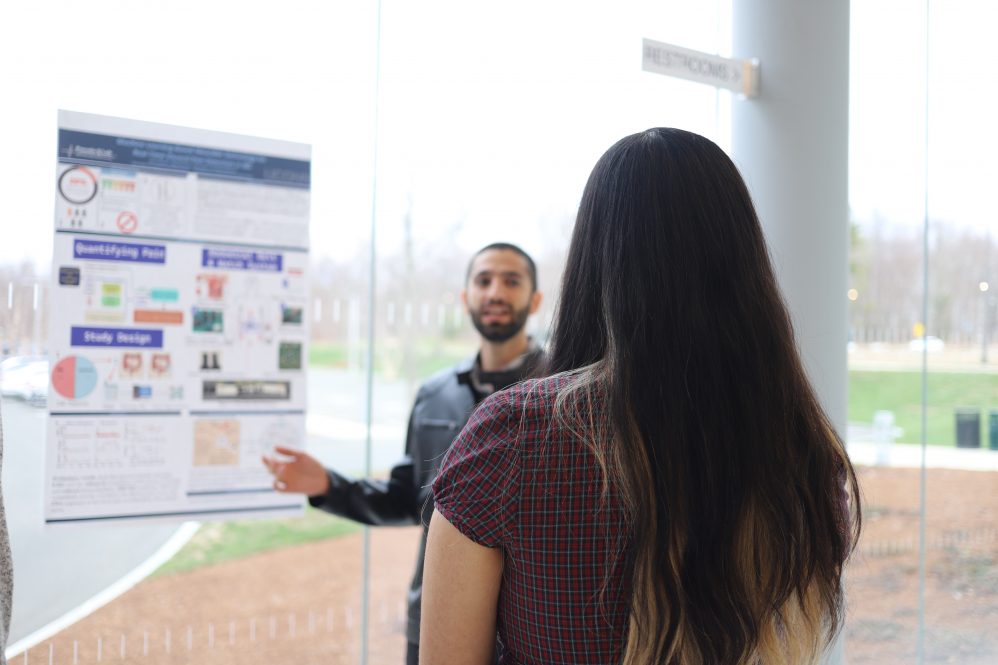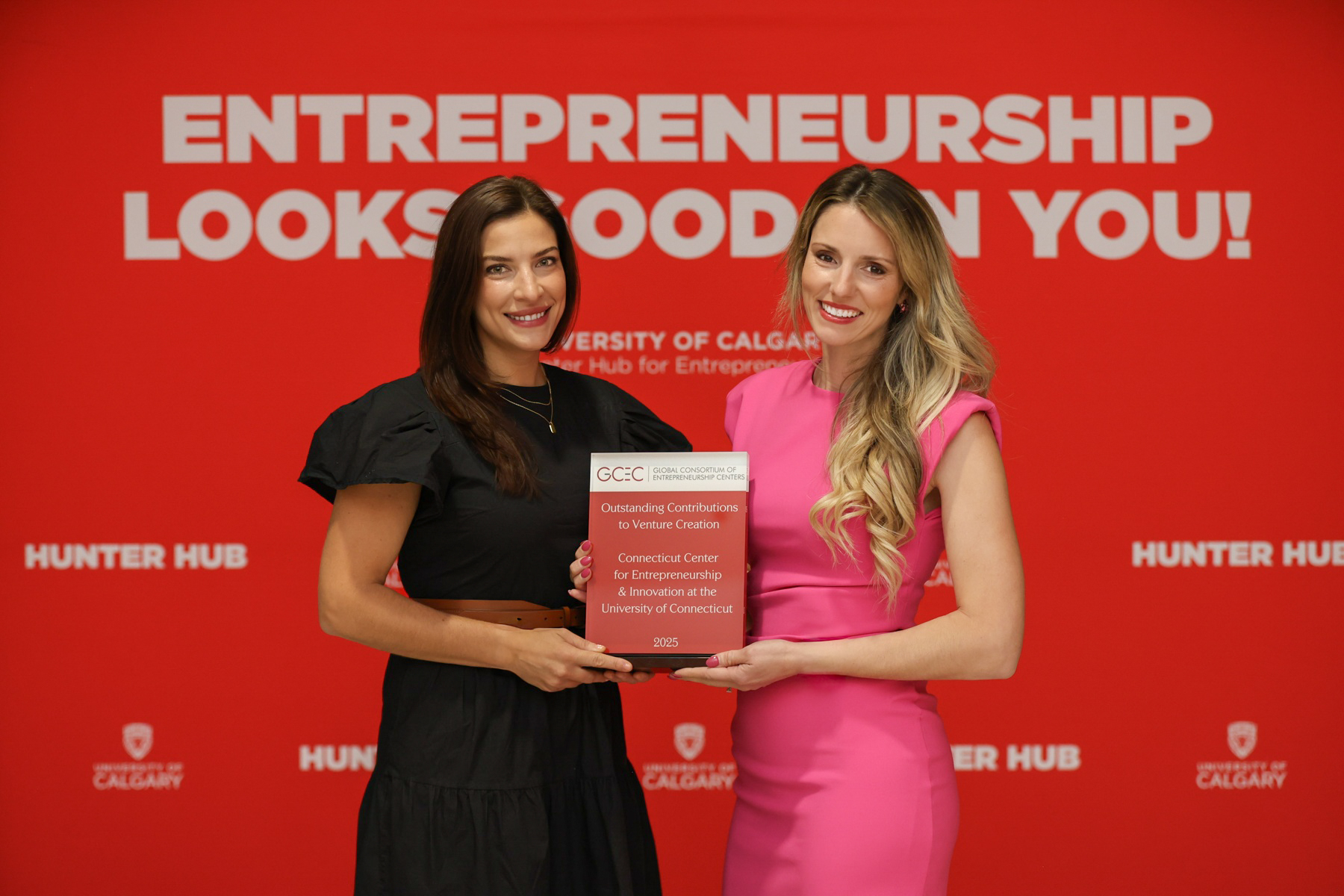When Harthik Parankusham ’28 (CLAS) visited his grandfather recently, the signs of cognitive decline were obvious – the family patriarch forgot his own grandson’s name.
Worldwide, 55 million people have undiagnosed mild cognitive impairment, or MCI, with 7.4 million in the United States alone, Parankusham says, noting that the current means of diagnosing something like Alzheimer’s disease – that is, MRIs, PET scans, and bloodwork – can be expensive and often come too late.
That got the physiology and neurobiology major thinking and deep in research. Could there be a means of early detection?
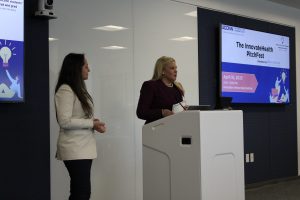
Parankusham’s Raayu Institute, comprising a national team of researchers, created a simple test for the linguistic biomarkers that show up years before other symptoms. It’s a test that asks patients to simply write a story while a computer analyzes their grammar, word choice, and cadence for anomalies.
“Let’s make Alzheimer’s and undiagnosed MCI a thing of the past,” he told a panel of judges on Wednesday, April 16 during the InnovateHealth PitchFest at UConn’s Innovation Partnership Building.
His pitch earned him first place in the Innovation Idea category.
“Every single pitch we saw today – whether it affected millions and millions of lives or just one life – it made the world a better place,” Michael McGuire, Beekley Medical director of strategic growth and innovations and one of the PitchFest judges, said. “An event like this today lets us know health care is in really good hands.”
From a portable test for tuberculosis from the team Clara Health to insoles with air chambers that adapt to an individual’s foot from the team SoleShift, which respectively won second and third place in Innovation, the late afternoon event gave each team five minutes to sell their idea.
But before attendees and a panel of judges settled in to hear from the students, they spent the day embracing possibility during the first part of the inaugural Nursing and Engineering Innovation Forum, a product of UConn’s Nursing & Engineering Innovation Center.
The center opened in 2023 and since then, has focused on research education, community engagement, and technology transfer, Tiffany Kelley, co-director and School of Nursing associate professor-in-residence, said. Its goal is to address health care challenges through new technology.
“Just one conversation can open the door,” she said of the event that drew about 100 registrants from a mix of industry, corporate partnerships, and UConn alums.
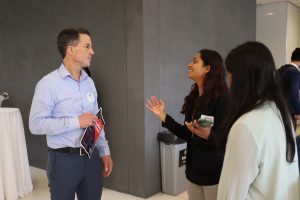
With Beekley Medical and VentureWell as sponsors, along with UConn’s College of Engineering, School of Nursing, Provost’s Office, Office of the Vice President for Research, and Innovation Partnership Building, the forum spotlighted researchers whose work has benefitted from Faculty Innovation Seed Grants and Faculty Senior Design Awards.
Presenters talked about using artificial intelligence to assess patients’ trust in their nurses and how AI can be used to fight pain and opioid dependence. They also detailed their work on humans’ sucking reflex and the use of pulse oximetry.
“Nurses have always been innovators. We can trace it back in our history,” School of Nursing Dean Victoria Vaughan Dickson said, adding that, nonetheless, “we often don’t see ourselves as innovators. We know the problems, we can think of some of the solutions … and by partnering with others who have other areas of expertise we can take those solutions into testing and into solving our problems.”
That spirit of teamwork was most evident during PitchFest, the Center’s second time hosting the event. Students came not just from majors like biomedical engineering and nursing, but also from elsewhere on campus, including places like digital media and design in the School of Fine Arts.
“People are talking, people are networking, it’s hard to get them back in their seats,” Leila Daneshmandi, Center co-director and assistant professor-in-residence in the College of Engineering’s biomedical engineering department, said during a break in the presentations.
When the time came, though, the audience hushed as the final five PitchFest teams, competing in the Prototype in Development category, took center stage.
The team Zemi already has raised $65,000 for their line of smart clothing – tight-fitting shirts and leggings outfitted with sensors to track an individual’s cardiac, skin, and muscular activity.
Zemi’s lab in Farmington, though, needs additional specialized equipment, especially since their clothing will be part of a National Institutes of Health research project through UConn.
John Toribio ’25 Ph.D. told the judges his project – conceived with Kyle Mahoney ’20 (CAHNR), ’22 MS, ’25 Ph.D. – is better than common wearable trackers that rely on estimated metrics and don’t detect medical events until well after the fact.
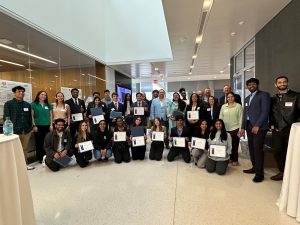
More electrodes, more data, he said.
With applications in health care, competitive athletics, and in exercise science institutes, Zemi can make clothing for just about any application from sleeping hospital patients to high-performance athletes.
Toribio’s pitch earned the team first place in the Prototype category. The team ChromaShield, with its early warning patch for radiation dermatitis, took second place, and the team Dentopa and its solution for tooth sensitivity took third.
“An event like PitchFest is so important because this really helps outline the future of health care,” McGuire said. “At Beekley, one of our core values is that in everything we do we want to make the world a better place. … As innovators in the health care space that’s ultimately our job and everyone in this room did it very well.”
“Nurses work on teams and this just really solidifies it,” Dickson added. “All of these groups were teams, whether there was one person presenting or two … that’s the core of nursing, being part of a team. And nurses lead teams, you saw here that nurses lead innovative teams.”
Daneshmandi noted that “engineers bring a unique lens of problem-solving and system design that when paired with the clinical insight of nurses unlocks entirely new solutions to longstanding health challenges. This kind of interdisciplinary collaboration is what drives transformative innovation in health care, and we’re working to foster this at the Center across students and faculty.”
